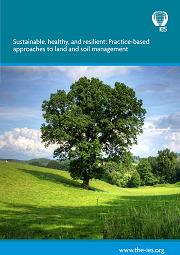The difference between a world which cares for its soil and one which neglects it is colossal. Currently, inaction is increasing the risk of climate change, food insecurity, flooding, biodiversity loss, and the collapse of the natural systems on which we rely. The benefits of healthy soil are poorly understood, yet play a key role in many areas of our lives. Decisive policy intervention could create a positive future: one where we have a sustainable climate, healthy food, and resilient communities.
Soil and land which is sustainable, healthy, and resilient can store more carbon to offset changing climates. Soil can improve the yields and nutritional content of our food. Soil can hold more water to manage the risk of flooding. Soil can support many biological processes, including habitats and ecosystems. It can quite literally become the ground on which our economic, social, and environmental wellbeing is built.
This report consolidates knowledge from the environmental sciences on the interactions between land management and soil resources, both from a natural capital perspective, and in terms of the range of benefits which can be achieved by approaching land and soil as an integrated system with consequences for the whole environment. The aim of the report is to share that consolidated knowledge with policymakers and decision-makers.
The report goes on to explore potential solutions. The first concerns how to measure and address the health and quality of soils, without needing to make difficult and subjective decisions about which properties of soil are more or less valuable, across multiple contexts and functions.
The other recommendations form the basis of different approaches to translate those measurements into policy and decision-making. The significance associated with healthy soil and an area of land will be contextual and interactive with other societal and financial constraints. It is therefore crucial that the wider benefits of good practice are understood, rewarded, and spread.
This has immediate consequences for Government target setting, where a long-term target on soil health would be made immediately realistic by this approach to assessments. The same system could also be used for regulation, oversight, or forming the basis of payment of ‘Public Money for Public Goods’, ELMS, and other CAP successor systems. Sustainable finance and agro-ecology present opportunities for private actors to improve and measure sustainability, keeping ahead of Government policy changes.
One approach takes a lesson from experiences of land contamination, where land purchase relies on assessing for contaminants. Requiring a direct assessment of the overall health of soil before land purchase would provide the basis of a system which values the inherent benefits of land and soil, removing short-term incentives and giving direct financial value to historically undervalued aspects of soil.
The challenges linked to soil are likely to affect all of society in the very immediate future. The answers to those challenges can only be found by better management of soil that improves its sustainability, health, and resilience.


